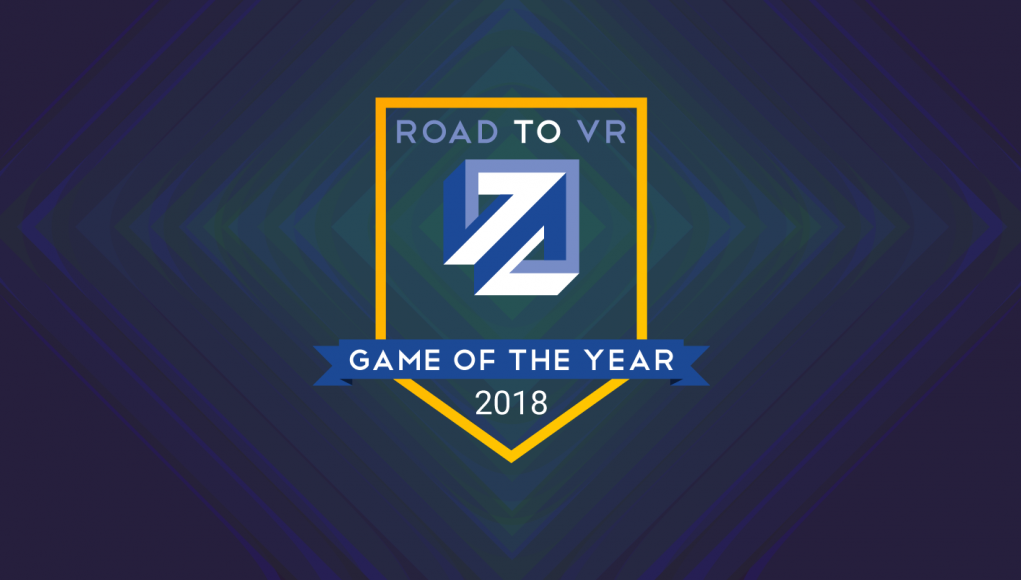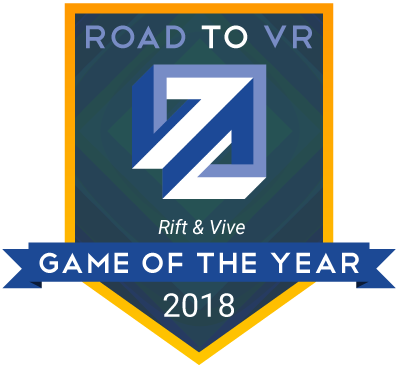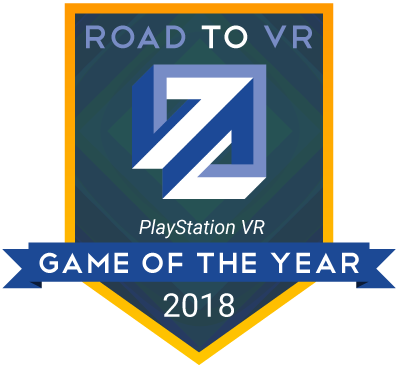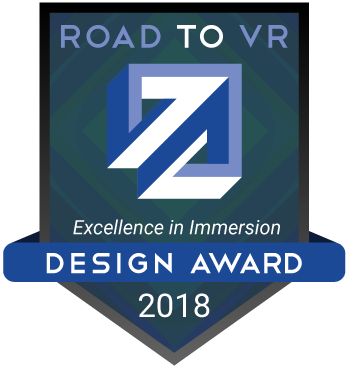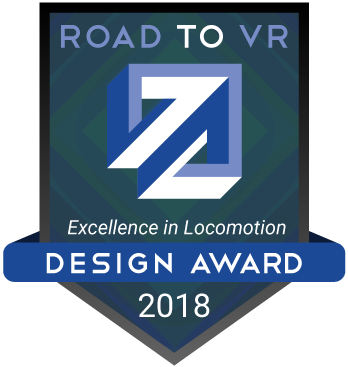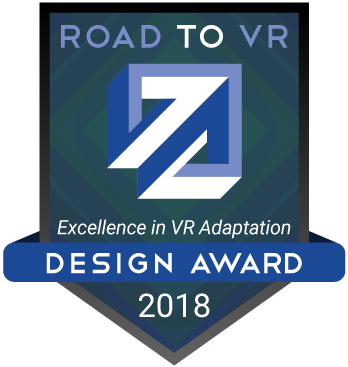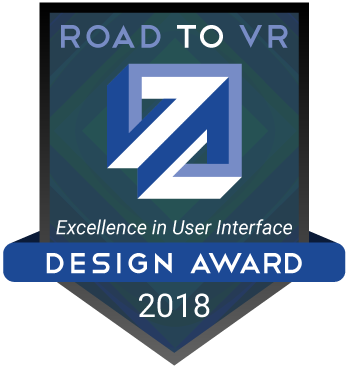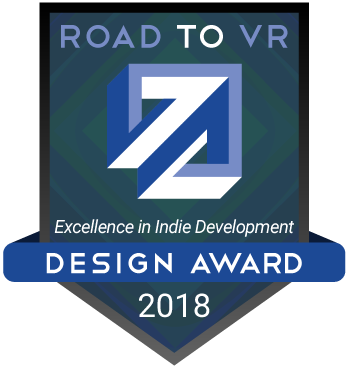Consumer VR is a little over two years old now, creeping up on three years next April. There’s been plenty to talk about in VR gaming over the course of 2018, with even more ambitious indie studios and AAA game companies getting into the medium for the first time. Now in our second annual Road to VR Game of the Year Awards, we’ve again put the top VR games from the industry’s leading platforms through their paces.
Update (December 20th, 2018): When we first published our second annual Game of the Year awards, we replicated the structure set last year by awarding a ‘best’ designation to one game for each of the major VR platforms. After publishing, thoughtful commentary from our community, kicked off by Doctor Bambi, led us to reevaluate whether that structure sufficiently highlighted achievements in VR game design in 2018.
Especially considering that Beat Saber swept Rift & Vive (and thus received a combined award), we’re in agreement that just two Game of the Year awards alone weren’t enough to capture achievements in VR game design in 2018. After much discussion and deliberation we’ve added five Design Awards in key categories which more broadly recognize excellence in VR game design throughout the year.
Like last year’s awards, we’ve again centered on broadening the task of weighing games according to the most immersive platforms available: Oculus Rift, HTC Vive, and PlayStation VR.
That said, 2018 has been a year of cross-platform pollination, so deliberation has been even more difficult this time around. To that end, we’ve combined Rift and Vive into a single category this year for two reasons. It’s partly due to the lack of compelling exclusives—good or bad depending on how you look at it—but it’s also partly because of Steam’s new keybinding tool lets users change how they control VR games, a one-time major factor in whether a game played better on one platform or another. With less of a distinction between the two in terms of functionality and content, the decision for this year’s format was clear (see update).
Now for Road to VR’s 2018 Game of the Year Award winners.
Beat Saber
Developer: Beat Games
Available On: Oculus (Rift), Steam (Vive, Rift, Windows VR), PlayStation (PSVR)
Release Date: May 1st, 2018 (Early Access, PC VR)
The words ‘killer app’ always rear their head when new consumer devices spring to life. Everyone wants to know what game, app, or tool will draw in the crowds and give them a reason to not only show off their shiny new toy to their friends and family, but also come back on their own for more.
Whether you believe in the idea of a ‘killer app’ or not isn’t important though, because a few things about the block-slashing rhythm game Beat Saber are: it’s an honest-to-goodness VR native that delivers a heart-pumping good time to everyone regardless of age, musical ability, or expertise with virtual reality headsets.
When we met up with Czech Republic-based indie studio Beat Games (then Hyperbolic Magnetism) at GDC 2018, it was apparent the small team had something special on their hands. The atmosphere was electric, the music was super high quality, the game’s haptic feedback made you feel like you were actually slicing through the colored directional boxes. Beat Saber was destined to compete with larger studios thanks to its ability to serve up something fresh, something insanely well done, and something we didn’t want to stop playing.
That premonition came true when Beat Saber launched into Early Access a few months later on Vive and Rift. While the game is still due for more updates, the community has stepped up in a big way to support the massive Beat Saber addiction that soon followed. Awesome mods aren’t a prerequisite for an awesome game, but they can oftentimes mean the difference between 10 hours of gameplay and 100 hours. As an indie studio working on a small budget, Beat Games understood it couldn’t promise a ton of chart toppers in its selection of music, but left a door wide open for groups such as Beat Saver to fill in the gaps, giving individual users the ability to map their own levels and serve up their own music, resulting in a mind-boggling number of well-realized levels for you to play with multiple difficulties.
Even then, if you stick to the standard level offerings—many of them created by the talented musician and composer Jaroslav Beck—it will be hard to come out of Beat Saber without a grin on your face, sweat on your brow, and the thought crossing your mind that we’re truly living in the future.
ASTRO BOT Rescue Mission
Developer: SIE JAPAN Studio
Available On: PlayStation
Release Date: October 2nd, 2018
From its origins as a mini-game released alongside PlayStation VR’s launch in 2016, finally culminating in a full-fledged title in 2018, ASTRO BOT Rescue Mission’s path to game of the year was long but definitely deserved. At first glance you might not peg this seated, gamepad-based third-person platformer as something that makes great use of the immersive power of VR, but Astro Bot confounds that expectation with smart design that plays to PlayStation VR’s strengths while avoiding its weaknesses.
Taking advantage of the motion-tracking capabilities of the PS4 gamepad, Astro Bot allows the player to feel like they’re there inside the game’s world by controlling a variety of entertaining ‘controller gadgets’ which are essential to battling through varied and beautiful environments as you track down Astro’s missing friends.
And then there’s the hulking robo-bosses which tower over the player (and especially little Astro), setting them far apart from the game’s otherwise tiny baddies. Astro Bot’s boss battles are engaging challenges, each of which play out like a unique interactive puzzle that you have to solve in real-time, usually involving some teamwork between yourself and Astro.
On top of being easily one of PlayStation VR’s best looking games, Astro Bot also manages to be delightfully accessible. It’s easy enough for novice players to jump in, have fun, and be wowed by VR, while still managing to engage experienced players with challenging coin placements and secret areas. Those who are especially dedicated will find a hidden chameleon on each stage which unlocks one of 26 challenge stages which are totally unique mini-levels which that players’ skills to the test.
Astro Bot Rescue Mission is a superb game; the promising result of tasking a group of clearly talented game designers and developers with building a game around a brand new medium like VR. The game expertly executes every idea it brings to the table. There’s charm throughout, derived from excellent animation, art direction, FX and SFX, right down to the interactive credits sequence.
Design Awards
Budget Cuts
Developer: Neat Corporation
Available On: Oculus (Rift), Steam (Rift, Vive )
Release Date: June 14th, 2018
Despite somewhat of a rocky launch this summer, one thing stealth adventure Budget Cuts has in spades is immersion, as it tosses you head over heels into a cartoony, but very believable office complex filled with imposing killer robots. The world around you just feels right, as you instinctively scramble for cover, or get down on your hands and knees to crawl through ventilation ducts in search of the best route through a level filled with attentive and deadly obstacles. Users will regularly find themselves in the fetal position under a virtual desk, hoping the athletic assassin-bots won’t track you down and send you back to the last save point with a bullet between your eyes.
All in all, Budget Cuts is a triumph in native VR design, offering engaging set pieces, excellent audio, extremely well-realized characters, and just enough danger (and punishment) to make every knife-throw count. Budget Cuts takes object interaction pretty seriously too, offering you the possibility of picking up and using nearly anything you come across in the office environment, making those impromptu scissor kills that much more fun.
Sprint Vector
Developer: Survios
Available On: Oculus (Rift), Steam (Rift, Vive, Windows VR), PlayStation (PSVR)
Release Date: February 8th, 2018
Locomotion design is one of the most challenging but important areas in VR today, and Sprint Vector single-handedly rewrote expectations for just how much and how fast you can move players virtually without making them sick.
In this Mario Kart-esque game, players race on foot in a sci-fi competition which has them speeding down the track, drifting around corners, bounding huge gaps, flying, and flinging themselves up massive walls. If you’ve ever felt uncomfortable in a VR experience before, your first reaction to seeing Sprint Vector’s crazy locomotion would probably be “no way, not for me.” And yet few players have trouble with the game’s ambitious movement scheme thanks to the studio spending considerable R&D time to deeply understand causes of motion sickness in VR and how to design around it.
The result is a game that’s so far unmatched in the speed and agility it offers to players while still widely maintaining comfort.
Hellblade: Senua’s Sacrifice
Developer: Ninja Theory
Available On: Steam (Rift, Vive)
Release Date: July 31st, 2018
Hellblade: Senau’s Sacrifice is an emotional experience that simulates psychosis, something that really intensifies in the VR version—now bundled with the BAFTA Award-winning PC game. The world of Hellblade is not only visually breathtaking, but the little things seem to draw you in even deeper in VR than on standard monitors; the game’s disembodied voices whisper into your ears and criticize your every move, level geometry mysteriously changes as you look away to accomplish another task, making you question your own sanity. Emotion-filled cutscenes are masterfully retained in the VR version by zooming the world out to a black void at key moments in the story, giving you a 16:9 window to view the drama as it unfolds.
Hellblade not only sacrifices very little to bring you the full experience intended by its creators, it truly feels like a VR native in the process, showing a keen understanding of what you should and shouldn’t do in a VR port to make it immersive, comfortable, and everything you hoped it would be.
Electronauts
Developer: Survios
Available On: Oculus (Rift), Steam (Rift, Vive, Windows VR)
Release Date: July 31st, 2018
While many VR games are still using basic laser pointer interfaces, the gameplay demands of Electronauts—a freestyle music game—demanded something significantly more thoughtful. The result is an innovative 3D interface which allows users to manage a complex set of tools without getting lost in menus or overwhelmed by screens. Interface usability, precision, and speed are all critical to Electronauts because the player needs to be able to make adjustments on the fly otherwise they’ll drop the beat.
Using virtual drumsticks as a means of interaction seems natural for the game considering the primary instruments are floating orbs which are struck like drums. But Suvrios discovered that using the drumstick as a pointing tool for everything else—managing track flow, adjusting loops, controlling effects, etc—is very natural too. The way that the studio opted to split up the game’s complex functionality into discrete tools (represented by cubes which are ‘plugged into’ fixed stations around the user) is an innovation not to be overlooked; it’s an extremely successful means of adding a spatial layer to the interface which adds significantly to usability.
Not every VR game needs a complex user interface, but for those that do, there’s many lessons to be learned from Electronauts.
COMPOUND
Developer: Bevan McKechnie
Available On: Steam (Rift, Vive)
Release Date: May 15th, 2018 (Early Access)
There are many indie VR projects in the works out there, but none like COMPOUND. Having released in Early Access this year, the game is a VR roguelike with a totally unique sense of style, and the clear result of heaps of passion from its sole developer, Bevan “NotDead” McKechnie.
From authentic retro-inspired art direction—which works surprisingly well in VR—to weapons ripe with personality, McKechnie has his own vision for what a VR game can be, and we’re excited to see what he comes up with next as COMPOUND continues to evolve.
Note: Games eligible for Road to VR‘s Game of the Year Award must be available to the public on or before December 1st, 2018 to allow for ample deliberation. Games must also natively support the target platform as to ensure full operability.

